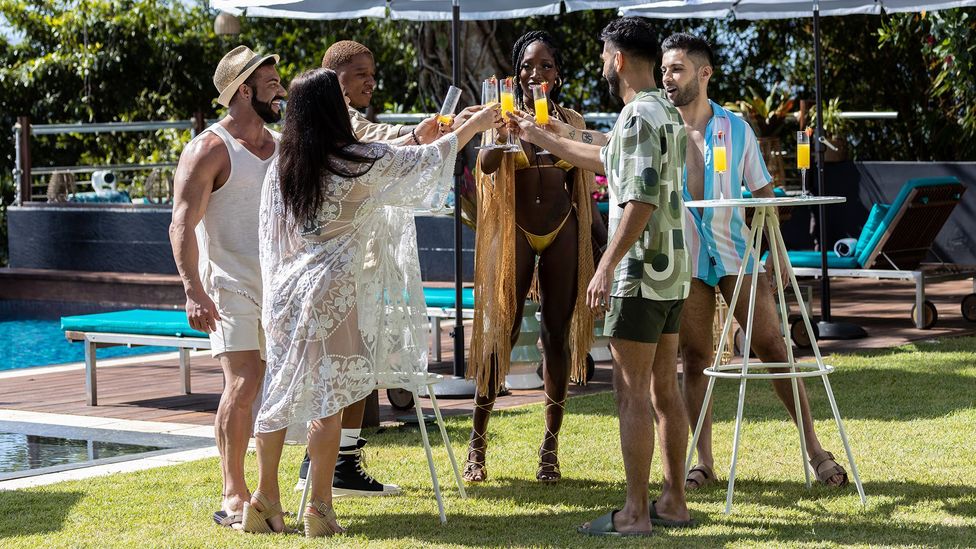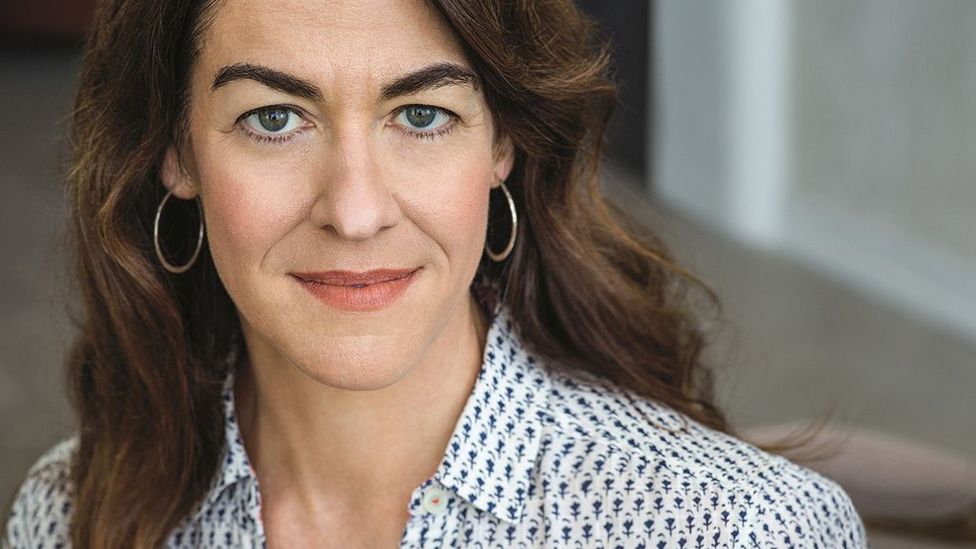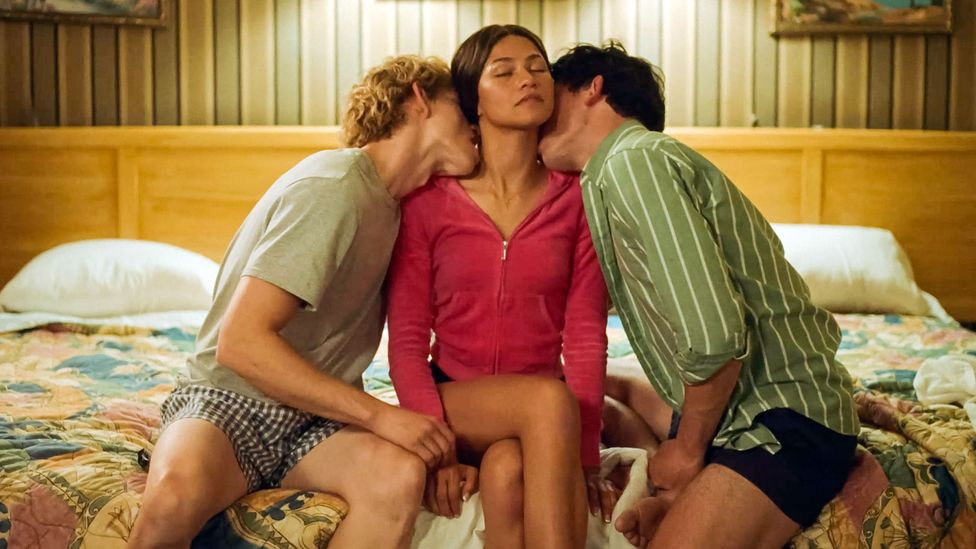“If you were given the chance at non-monogamy in paradise, what would you say?” That’s the premise behind a new US dating show, Couple to Throuple, in which four couples arrive on a tropical island resort “to turn fantasy into reality”. For each of them, that fantasy involves inviting one of 14 glamorous singles to join them in a throuple to see if the polyamorous lifestyle could be for them.
More like this:
– Could reality TV save your relationship?
– The ménage-à-trois on screen
– How the Bloomsbury group unbuttoned Britain
“This is a safe place for you to dive into that question,” says host Scott Evans, as the couples stand wide-eyed on the sand. In a matter of hours they’re all climbing into bed with a third person (accompanied by night-vision cameras, of course). Fast forward to the next morning and – predictably – things get messy. There are arguments, regrets, and a whole tonne of awkwardness.

Couple to Throuple sees couples deciding whether to introduce a third person into their relationship (Credit: Peacock)
In exploring polyamory, Couple to Throuple might be breaking some new ground for a dating show (though a handful of others, including Channel 4’s Open House: The Great Sex Experiment – which premiered in the UK in 2022 – have already explored what that show described as “one of society’s greatest taboos“), but a sensitive and nuanced exploration of non-monogamous relationships this is not. It’s played for drama from the start. Even so, it’s the latest example of polyamory – or more broadly ethical non-monogamy – hitting the mainstream. Ethical non-monogamy is an umbrella term for various different consensual non-exclusive relationships, including open marriages, where couples are romantically monogamous but not sexually. Polyamory specifically refers to having multiple romantic relationships at the same time.
In the last few weeks, ethical non-monogamy has taken over the cultural conversation. In January, New York Magazine ran a cover story on polyamory, arguing that it is, if not mainstream, then increasingly common. It featured an in-depth guide on how to open up relationships and a report on a polycule (a network of people in non-monogamous relationships).
It coincided with the release of a new book, More: A Memoir of Open Marriage by Molly Roden Winter. The author, a 51-year-old former teacher, details the open marriage she and her husband embarked on in 2008. Since publication, it’s garnered huge coverage and spurned countless think pieces (How Did Polyamory Become So Popular? asked The New Yorker).
Polyamory, open relationships, free love, non-exclusive arrangements… however you choose to describe it, ethical non-monogamy is certainly nothing new. The term polyamory, where both partners can have multiple intimate relationships at the same time (not to be confused with polygamy, where one person has multiple partners) originated in the early 1990s, though multi-partner relationships have dated back decades, or even centuries.
The Ethical Slut, published in 1997, is known as the original bible of ethical non-monogamy — though for decades it still felt like the subject was on the fringes. More recently though, leading sex therapists like Esther Perel have brought polyamory into the public discussion.
On screen, TV and movies are starting to explore less conventional relationship models. In last year’s Passages, one half of a gay married couple begins a heterosexual relationship with a woman. Upcoming Luca Guadagnino film Challengers, starring Zendaya, has been described as a “polyamorous tennis romp” – though it’s not clear whether the threesome hinted at in the trailer extends to a full-on relationship.
More than a fashion
However this idea that polyamory is “in vogue”, is causing some pushback. The author of More resides in Brooklyn’s affluent Park Slope neighbourhood and, coupled, with the New York Magazine article, there’s scepticism over polyamory being packaged up as the latest lifestyle choice for well-off urbanites. “The very class of Americans who most reap the benefits of marriage are the same class who get to declare monogamy passé and boring,” writes Tyler Austin Harper in The Atlantic.
Yet statistics do back up the idea that it’s becoming more common. According to Pew Research, 51% of adults under 30 in the US think that open marriage is acceptable – while YouGov data shows a third of Americans describe their ideal relationship as something other than complete monogamy.

Writer Molly Roden Winter has made headlines with her new book about her open marriage (Credit: Nina Sudin)
“I’ve definitely seen more people who are open to or wanting to explore polyamory over the last couple of years,” says sex and relationship therapist Rhian Kivits. “Some of these clients have been couples who have wanted to consider how they can open their marriages or long-term relationships up and others have been singles who have wanted to explore how polyamory could fit into their lives and understand more about why they are drawn to the idea.”
However, in Kivits’ experience, it’s almost exclusively clients under 40 who want to discuss the idea, she says, adding that social media – and TikTok especially – has given young people a platform to talk about their experiences with non-ethical monogamy and how it works for them. “This has served to normalise and demystify polyamory and to some extent, make it more widely accepted because the content being shared is relatable for many people. It’s also helped clear up a misconception that polyamory is all about sex or swinging – it’s about connection and relating.” Dating apps like Feeld have also made it easier to navigate non-monogamy.
Couples therapist Lucy Cavendish, host of the Later Dater podcast and author of forthcoming book How to Have Extraordinary Relationships, agrees that it’s younger generations that are driving change. “Younger couples that come and see me, those in their 20s or early 30s, are completely cool with polyamory and some of them are in ethical non-monogamous relationships,” she says. But even older couples – especially those for whom one is now much less interested in sex than the other – are more willing to consider an open marriage. “When I say ask if they have considered ethical non-monogamy, a lot of them are more open to it that than they probably were 10 years ago.”
So perhaps it’s no surprise that popular culture is racing to reflect this apparent shift in attitudes – even if it doesn’t always get it right. One major criticism about Couple to Throuple – particularly from the non-monogamy community on Reddit – is that it’s presenting an extremely narrow view of non-monogamous relationships. The focus is on existing couples adding a third component to their relationship, rather than seeking out new connections independently. All but one of the couples – at least in the first three episodes – consist of a man and a woman looking for a bisexual woman. While most of the “singles” on the show have had previous experience with polyamory and are in it for real, it feels more like the couples are just trying it on for size.

The trailer for new film Challengers suggests the drama hinges on a threesome situation – but will that extend to a polyamorous one? (Credit: Alamy)
It’s not the only recent pop cultural depiction of polyamory that’s drawn ire from the community.
Teen drama Riverdale ended its run last year by placing four of the main characters in a four-way romantic relationship. “It’s frustrating that Riverdale used its characters’ non-monogamous relationship as a ‘shocking twist’ rather than engaging with an authentic portrayal of non-monogamy as simply being part of people’s identities,” said Brett Chamberlain, Executive Director of OPEN (Organisation for Polyamory and Ethical Non Monogamy).
TV and film might have some way to go in their depictions of polyamorous relationships, but Lucy Cavendish thinks that questioning the default of monogamy is, overall, a helpful thing – even if the reality is not for everyone. “It’s about your levels of security. A lot of people don’t like it because they’re terrified the person they love is going to leave them and we’re hard-wired not to want that to happen,” she says. “But I think broadening out our dialogue around relationships and sex is a really helpful thing to do.”
.